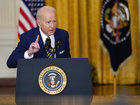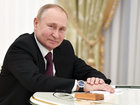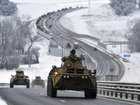Israel is hoping the U.N. General Assembly will unanimously adopt a resolution rejecting and condemning any denial of the Holocaust and urging all nations and social media companies "to take active measures to combat antisemitism and Holocaust denial or distortion."
The 193-member world body is scheduled to vote Thursday on the resolution, which is strongly supported by Germany.
 Full Story
Full Story
President Joe Biden has said he thinks Russia will invade Ukraine and warned President Vladimir Putin that his country would pay a "dear price" in lives lost and a possible cutoff from the global banking system if it does.
Biden, speaking at a news conference to mark his one-year anniversary in office, also said a "minor incursion" by Russia would elicit a lesser response. He later sought to clarify that he was referring to a non-military action, such as a cyberattack, that would be met with a similar reciprocal response, and that if Russian forces cross the Ukrainian border, killing Ukrainian fighters, "that changes everything."
 Full Story
Full Story
The first flights carrying fresh water and other aid to Tonga finally arrived Thursday after the Pacific nation's main airport runway was cleared of ash left by a huge volcanic eruption.
New Zealand and Australia each sent military transport planes that were carrying water containers, kits for temporary shelters, generators, hygiene supplies and communications equipment. The Australian plane also had a special sweeper to help keep the runway clear.
 Full Story
Full Story
Russian President Vladimir Putin has hosted his Iranian counterpart, hailing the two countries' cooperation on the crisis in Syria and other international issues.
Greeting Iranian President Ebrahim Raisi at the start of their talks at the Kremlin, Putin noted that shared efforts by Moscow and Tehran have played a key role in "helping the Syrian government overcome the threats posed by international terrorism."
 Full Story
Full Story
In the dark streets of a Beirut now often without electricity, sometimes the only light that shines is from headlamps worn by scavengers, searching through garbage for scrap to sell.
Even trash has become a commodity fought over in Lebanon, mired in one of the world's worst financial crises in modern history.
 Full Story
Full Story
British Prime Minister Boris Johnson defied calls to resign in a feisty performance Wednesday in Parliament — but it may be too little to prevent his Conservative Party's lawmakers from trying to oust him over a string of lockdown-flouting government parties.
Pressure on the prime minister grew as one Conservative lawmaker defected to the opposition Labor Party and a former member of Johnson's Cabinet told him: "In the name of God, go!"
 Full Story
Full Story
Russia maintained a tough posture amid the tensions over its troop buildup near Ukraine, with a top diplomat warning Wednesday that Moscow will accept nothing less but "watertight" U.S. guarantees precluding NATO's expansion to Ukraine.
Deputy Foreign Minister Sergei Ryabkov, who led the Russian delegation at the security talks with the U.S. in Geneva last week, reaffirmed that Moscow has no intentions of invading Ukraine as the West fears, but said that receiving Western security guarantees is the categoric imperative for Moscow.
 Full Story
Full Story
A U.N. agency appealed Wednesday to the international community to donate tens of millions of dollars to help improve living conditions for Palestinians in crisis-hit Lebanon.
The appeal by the agency for Palestinian refugees, or UNRWA, is asking for an additional $87.5 million is to provide Palestinian refugees with cash assistance to the poorest, cover hospital expenses, as well as transportation for children so that they can go to school.
 Full Story
Full Story
A snowstorm in the Middle East has left many Lebanese and Syrians scrambling to find ways to survive, burning old clothes, plastic and in some cases even sheep manure to keep warm as temperatures plummet and poverty soars.
The storm, dubbed "Hiba" in Lebanon, began Tuesday night and is expected to peak on Thursday. The small country's massive economic collapse and currency crash has meant an increasing number of Lebanese families are not able to afford fuel to heat their homes this winter.
 Full Story
Full Story
A Lebanese American man's survivors, who filed an ambitious lawsuit last year alleging Lebanon's security agency kidnapped and tortured him before he died in the U.S., hope to find an opening after the agency recently responded in an American court.
Amer Fakhoury died in the United States in August 2020 at age 57 after suffering from stage 4 lymphoma. His family's suit says he developed the illness and other serious medical issues while imprisoned during a visit to Lebanon over decades-old murder and torture charges that he denied.
 Full Story
Full Story



